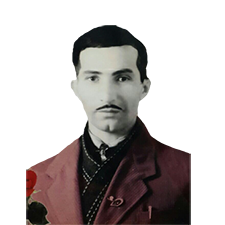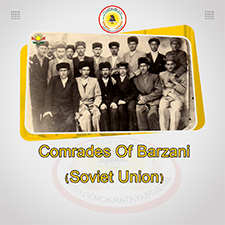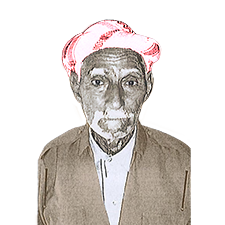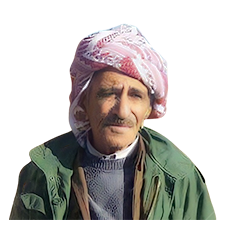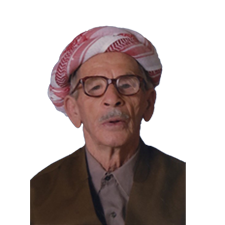Biography
He was born in 1925 in Argoshi village, Sherwani Mazen sub-district, Mergasur district, Erbil province. On June 21, 1932, he emigrated to the Republic of Turkey with his family. Before going to the Soviet Union, he was married to Gulbayaz Aziz Hamid and they had a son, Mosleh Saleem in 1948.
Saleem Rashid Saleem studied in the Soviet Union and received an agricultural technical degree. In 1959, he was employed as an artistic observer in the Sulaimani Agricultural Office. He was fluent in Kurdish, Turkish, and Russian. He died in 1967 in Argosh village and was buried there.
Service Record
In 1943, he joined the ranks of the Second Barzan Revolution. On October 12, 1943, he participated in the conquering of the police station of Kherzoki. On August 19, 1945, all his mobile and non-mobile property was confiscated by order of the Iraqi Military Customary Court.
On 11 October 1945, he moved to East Kurdistan after the failure of the Second Barzan Revolution. On 31 March 1946, he joined the Barzani Forces of the Kurdistan Democratic Republic Army in Mahabad. He was one of the Peshmergas who returned to Sherwan and Mazuri on 19 April 1947, through Khawkurk and Dashti Barazgar in North Kurdistan.
After their return, General Mustafa Barzani held a meeting with his comrades in the village of Argosh on 15 May 1947. He gave his comrades a free choice whether they want to stay or go to the Soviet Union. All his comrades decided to continue and leave for the Soviet Union. On May 23, 1947, Shamdin accompanied General Mustafa Barzani to the Soviet Union and participated in the Battle of Qtur People and the Battle of Mako Bridge. On June 18, 1947, after plenty of difficulty, he crossed the Aras River on the border between Iran and the Soviet Union.
After arriving in the Soviet Union, on June 19, 1947, he and all his comrades were detained in Nakhchivan, Azerbaijan, for forty days in an open community surrounded by barbed wire and guarded by soldiers. In terms of food, clothing, and transportation, they had been treated as prisoners of war. They were later divided into the regions of Aghdam, Lachin, Ayulakh, and Kalbajar in the Republic of Azerbaijan on the decision of the Soviet government. On December 10, 1947, they were transferred to a military base on the Caspian Sea in Baku, the capital of the Republic of Azerbaijan. On the 23rd of the same month, they were given military uniforms and received eight hours of daily military training under the supervision of officers of the Republic of Azerbaijan. At the same time, they were taught Kurdish for four hours a day by some of their educated comrades.
After Jafar Bakirov's mistreatment of his comrades, President Barzani decided to move his military camp from Azerbaijan on August 29, 1948, to the community of Chirchuk near Tashkent, the capital of Uzbekistan, where they continued their military training.
In March 1949, he and his comrades were distributed by train to the villages of the Soviet Union and worked on the farms of the “Kolkhozes” (land that people rented from the government and then gave a share of the product to the government). He worked in the Show area near Mosco.
After much effort and sending several letters by General Barzani to Stalin, Stalin finally received a letter in which Barzani talked about the suffering of his comrades. He immediately decided to form a committee to investigate the situation of Barzani's comrades. The committee finally decided to gather them all in Vrevsky, so in November 1951, General Barzani and his comrades went to Vrevsky, Soviet Union.
After the July 14, 1958 revolution in Iraq and the return of General Mustafa Barzani, on February 25, 1959, according to both Articles 3 and 7, paragraph (a) of Article 10 and according to Article (11), and based on the amended law No. 19, General Mustafa Barzani and his comrades were granted a general amnesty.
In 1958, the Iraqi Republic was established under the leadership of Abdul Karim Qasim. On April 16, 1959, President Barzani returned to Kurdistan with his comrades on the Groza ship through the port of Basra in southern Iraq.
He participated in the September Revolution in 1961. In 1961, he participated in the Battle of Pierce. In the same year, he participated in the Battle of Defending Barzan.
Sources:
-
حهمید گهردی، پوختهی مێژوونامه، چاپی یهكهم، (ههولێر - دهزگای چاپ و بڵاوكردنهوهی ئاراس - چاپخانهی وهزارهتی پهروهرده - 2004ز).
-
حیدر فاروق السامرائي، ضیاء جعفر ودوره السیاسي و الاقتصادي في العراق، (لندن – دارالحكمة - 2016م).
-
سهفهر یوسف میرخان، بارزانی نهمر دیفهرموو ئهگهر نانێكیان دا پێمان دهیخۆن ئهگهر نا به برسێتی دڕێژه به ڕۆیشتنمان دهكهین، رۆژنامهی خهبات، ئورگانی پارتی دیموكراتی كوردستان، ژماره 3713، ههولێر، 7 ئاداری 2011ز.
-
شهعبان عهلی شهعبان، ههندێك زانیاری سیاسی و مێژوویی، چاپی سێیهم، (ههولێر - چاپخانهی ڕۆژههڵات - 2013ز).
-
صالح یوسف صوفي، كرۆنۆلۆژیا كوردستانێ و جیهانێ، چاپا ئێكێ، بهرگێ سێ، (دهۆك - چاپخانا پارێزگهها دهۆكێ - 2013ز).
-
صالح یوسف صوفي، كرۆنۆلۆژیا كوردستانێ و جیهانێ، چاپا ئێكێ، بهرگێ دووێ، (دهۆك - چاپخانا پارێزگهها دهۆكێ - 2013ز).
-
عمر فاروقی، سردار دانا زندگی و مبارزات مرحوم ملا مصطفی بارزانی، چاپ دوم، (ههولێر - چاپخانهی وزارت آموزش و پرورش - 2002ز).
-
عهبدولڕهحمان مهلا حهبیب ئهبوبهكر، عهشیرهتی بارزان له نێوان 1931 - 1991، چاپی یهكهم، (ههولێر - چاپخانهی وهزارهتی رۆشنبیری - 2001ز).
-
له یادداشتی فهرماندهی شههید حهسۆ میرخان ژاژۆكی، 62 رۆژ لهگهڵ بارزانی دا چوونی بارزانییهكان بۆ یهكێتی سۆڤێت، چاپی یهكهم (ههولێر - چاپخانهی رۆشنبیری - 1997ز).
-
لیث عبدالمحسن جواد الزبیدي، ثورة 14 تموز 1958 في العراق، (بغداد - دارالرشید للنشر - 1979م).
-
محهمهد ساڵح پێندرۆیی (جگهرسۆز)، ژیانی كهلتووری و كۆمهڵایتی دهڤهری مزووری باڵا، (ههولێر –چاپخانهی رۆژههڵات -2020ز).
-
مسعود بارزانی، بارزانی و بزوتنهوهی رزگاریخوازی كورد 1931 - 1958، (دهۆك - چاپخانهی خهبات - 1998ز).
-
نهجهف قولی پسیان، له مهابادی خوێناوییهوه ههتا لێوارهكانی ئاراس، و. شهوكهت شێخ یهزدین، چاپی یهكهم، (پیرمام - یۆبیلی زێڕینی پارتی دیموكراتی كوردستان - 1996ز).
-
ئـ.د.ئـ، فایلی ژماره AI-10، لیستی ههڤاڵانی مستهفا بارزانی بۆ یهكێتی سۆڤێت، بهڵگهنامه لهلایهن سهگڤان هاڵۆ پێشكهش كراوه، 2016ز، ل 26.
-
ئـ.د.ئـ، فایلی ژماره HB-159، پارتی دیموكراتی كوردستان، بارهگای بارزانی، لێژنهی باڵای ناوچهی بارزان، فۆرمی سەلیم رەشید شەمدین عومهر، پیرمام، 1 تشرینی دووهمی 2018ز، ل 1.
-
ئهرشیفی دهستهی ئینسكلۆپیدیای پارتی دیموكراتی كوردستان.




